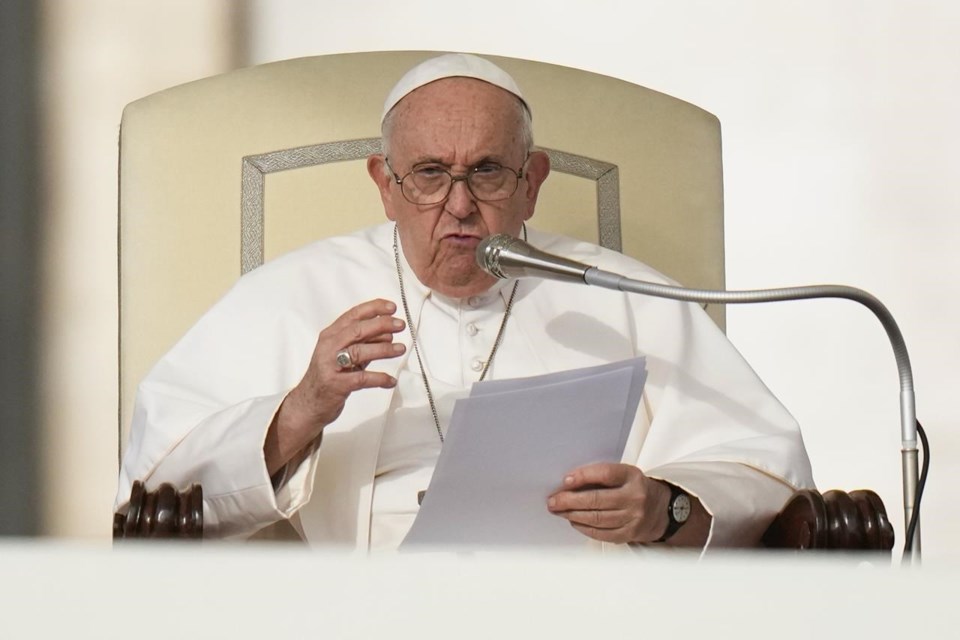ROME (AP) — Pope Francis has ordered the Vatican to reopen the case of a well-known priest-artist accused of sexually, psychologically and spiritually abusing adult women, and removed the statute of limitations that had previously prevented a church trial based on their claims.
The Vatican's announcement Friday marked a major turnaround for the Holy See and followed a growing outcry among abuse victims and their advocates over the handling of the case of the Rev. Marko Ivan Rupnik, a once-exalted Jesuit preacher whose mosaics grace churches and basilicas around the world.
The Rupnik scandal has been a headache for the Jesuits, the Vatican and Francis himself due to suspicions that he received favorable treatment from the Holy See, where a Jesuit is pope and other Jesuits head the sex crimes office that investigated Rupnik and declined to prosecute him because the claims against him were deemed too old.
A Vatican statement said Francis' abuse prevention commission had flagged “serious problems” in the way his case was handled initially, particularly in the “lack of outreach to victims.” That terminology was significant in itself because church authorities previously refused to even consider the women with claims against Rupnik as “victims.”
Francis asked the Vatican's Dicastery for the Doctrine of the Faith, which handles abuse-related crimes according to church law, “to review the case and decided to lift the statute of limitations to allow a trial to take place," the statement said.
Rupnik, a Slovene priest, was declared excommunicated by the Vatican in May 2020 for one of the most serious crimes in the Catholic Church's legal code: using the confessional to absolve a woman with whom he had engaged in sexual activity. But the excommunication was lifted two weeks later, and he continued in his artistic and preaching activities, which include running an art and study center in Rome.
When nine more claims against him were presented to the Vatican a year later, dating from 30 years ago, the sex crimes office refused to waive the statute of limitations against him. The office, where a Jesuit priest is the prosecutor, also decided not to pursue other allegations against him such as false mysticism which historically aren't subject to time limits.
The Jesuit order kicked Rupnik out this summer after even more adult women came forward accusing him of sexual, psychological and spiritual abuses. After conducting their own investigation, the Jesuits said they found the women’s claims to be “very highly credible." But they said the Vatican’s canonical norms in force at the time of the alleged abuse precluded a canonical trial or harsher punishment.
In the end, the Jesuits expelled him not because of allegations of abuse, but because of his “stubborn refusal to observe the vow of obedience.” The Jesuits had exhorted Rupnik to atone for his misconduct and enter into a process of reparation with his victims, but he refused.
On Friday, Rupnik's former Jesuit superior, the Rev. Johan Verschueren, welcomed the announcement that a church trial would finally take place, calling it a “major step” in the right direction.
“Finally justice can have a chance: for the alleged victims and testimonies — they can be heard and recognized in their dignity,” and for Rupnik, who can defend himself, he said in an email. He said he hoped for a fair trial and just outcome, so that the "confusion in the church may soon come to an end.”
Francis' Pontifical Commission for the Protection of Minors, which had flagged the Rupnik case as problematic, also welcomed the announced trial as crucial “not only for the victims but for the whole church.”
“There is no room in ministry for those who would violate so profoundly those entrusted to their care,” the commission said in a statement, adding that it remained concerned overall about the church's disciplinary procedures and their “inadequacies.”
In a Jan. 24 interview with The Associated Press, Francis denied he had any role in the handling of Rupnik’s case, other than to intervene procedurally. However, he reaffirmed the decision not to waive the statute of limitations for the women's claims, saying he always lifts time limits for abuse of minor cases, but not those involving adults.
His decision to reverse course and allow the old claims to go forward in a trial suggested a realization that the scandal was now seriously undermining his credibility and jeopardizing any progress the church had made in combating abuse. Francis' conservative opponents, in particular, were increasingly using the Rupnik scandal to discredit the pope, much as they did during the 2018 scandal over ex-Cardinal Theodore McCarrick, who was also accused of misconduct with adults but was long given a pass by the Vatican.
The Catholic Church has long responded to women who report priests for abusing their authority by blaming the women for seducing the churchmen, portraying them as mentally unstable or minimizing the event as a mere “mistake” or “boundary violation” by an otherwise holy priest. Those same claims were used by Rupnik's supporters to discredit his accusers.
Francis' recent gestures and statements had raised questions about whether he too sided with Rupnik.
For starters, Francis met with Rupnik's main supporter, who has lashed out at what she called the “lynching” he received in the press. Then, Francis' own Vicariate of Rome issued a statement seemingly casting doubt on the validity of the excommunication decree.
Those gestures prompted five of Rupnik's alleged victims to break their silence and pen a signed, open letter saying such attitudes from Rupnik's superiors had revictimized them and showed that church pledges of “zero tolerance” for abuse were just a “publicity stunt.”
The outcry only grew this week when a diocese in Rupnik's native Slovenia announced it had welcomed him in after the Jesuits threw him out. The diocese of Koper said it had done so because it had received no documentation about any conviction against him, and that he was presumed innocent.
Nicole Winfield, The Associated Press

